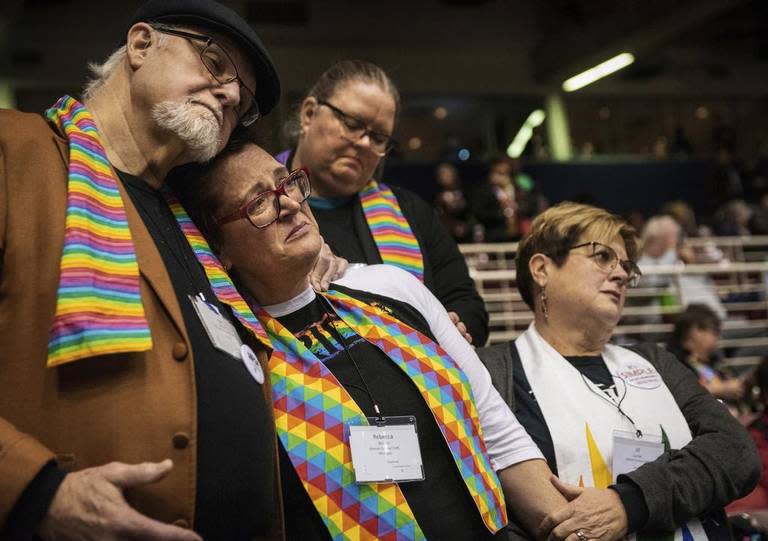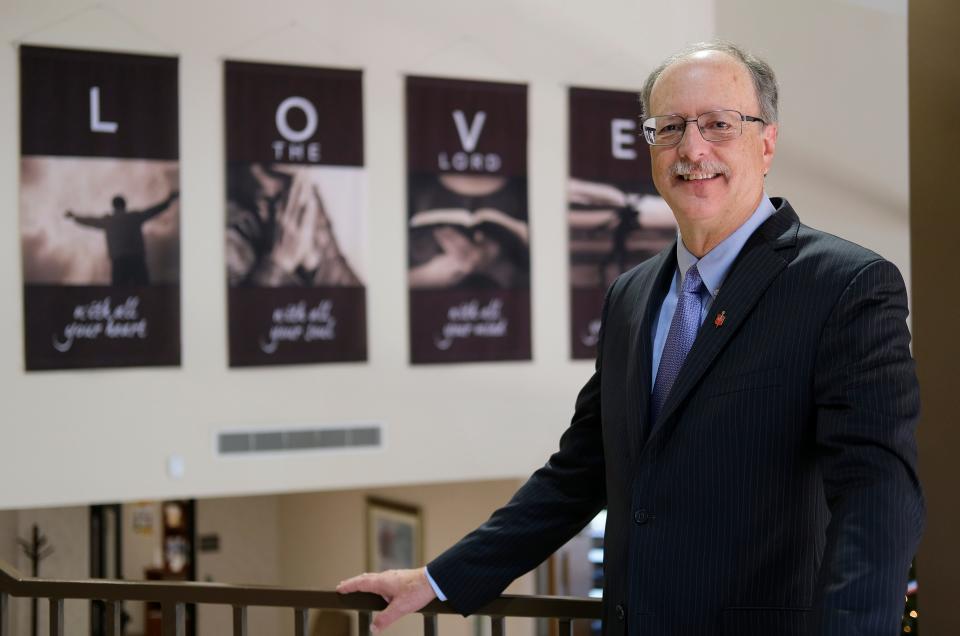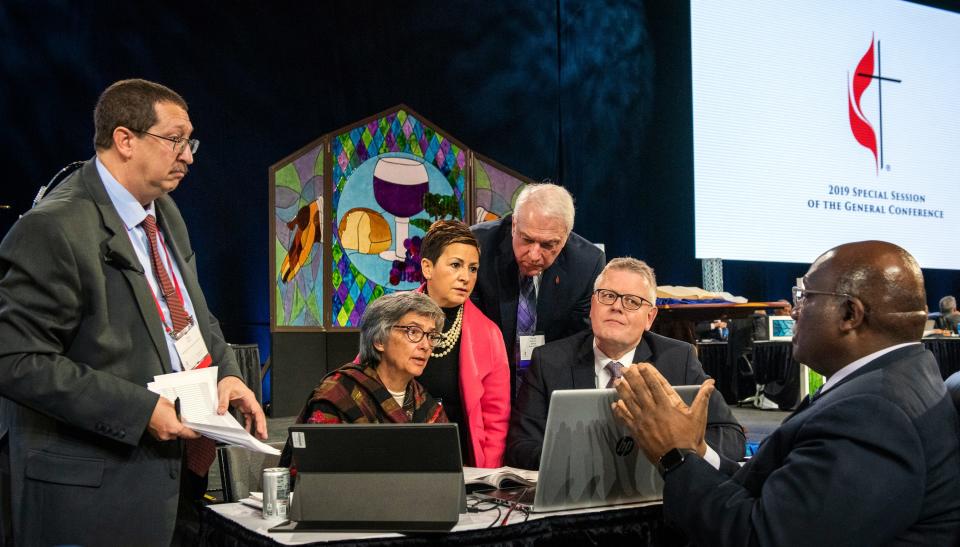What we know: Oklahoma churches seeking to cut ties with United Methodist denomination

The United Methodist Church ― Oklahoma's second-largest faith group ― is in the midst of a schism that has been gradually widening over the course of several decades.
Disagreement about the scriptural compatibility of same-sex marriage and the ordination of openly gay clergy is at the heart of the divide. The issues are coming to a head for many churches, prompting them to seek to leave the denomination. And two of the state's largest United Methodist churches, St. Luke's in Oklahoma City and Tulsa's Asbury Church, are among the congregations that have severed denominational ties thus far.
Here's what we know about the slow but steadily widening rift and how it is playing out in Oklahoma.
What is the United Methodist Church?
The United Methodist Church is a worldwide Christian Protestant denomination, with 13 million members in more than 45 countries ― and almost 7 million in the U.S. It is the second-largest Protestant denomination in America, after the Southern Baptist Convention.
In Oklahoma, the United Methodist Church is the second-largest faith group in the state, behind Southern Baptists. The denomination has 408 affiliated churches in the state. Southern Baptists have 1,700 churches in Oklahoma.
What's going on?
Across the world, United Methodist regional bodies — called annual conferences — are negotiating with churches that wish to withdraw from the United Methodist Church over issues including same-sex marriage and gay clergy. The process of withdrawing is called disaffiliation. United Methodist clergy who wish to cut denominational ties will be required to go through a formal withdrawal process from the United Methodist Church.
Oklahoma has two conferences led by Bishop Jimmy Nunn ― the Oklahoma United Methodist Conference and the Oklahoma Indian Missionary Conference.

Why do churches want to disaffiliate ― cut ties ― with the United Methodist Church?
Over the years, discord over the denomination's ban on same-sex marriage and the ordination of openly gay clergy has been building, and it doesn't appear to have an easy solution. In Oklahoma, there are some churches that don't agree with the same-sex marriage and openly gay clergy ordination prohibition set forth in the denomination's Book of Discipline, a policy book. These congregations, often described as progressive or moderate, no longer want to be a part of a denomination that they feel is exclusionary and placing limits on LGBTQ individuals and their full inclusion in church life.
However, it's probable that there are more Oklahoma churches currently attempting to sever ties who do agree with the denomination's ban on same-sex marriage and the ordination of openly gay clergy. Why would they want to disconnect from the denomination if the prohibition is in keeping with their own theology? By many accounts, most of these churches, considered conservative or traditionalist, are frustrated by the longstanding and increasingly contentious denominational debate over the same-sex marriage/openly gay clergy ordination ban. They also think the denomination is likely headed toward gay inclusion.
They have pushed back against criticism describing them as homophobic because they consider themselves to be true adherents of biblical scripture, which says marriage is between one man and one woman and homosexuality is incompatible with scripture.
These conservative congregations also are unhappy with United Methodist bishops and what they see as the leaders' refusal to punish clergy who disregard the ban, especially when the punishment for such defiance was boosted in 2019. There are some congregations that also have problems with what they see as a theological disconnect, which allows some churches and church leaders to disavow some core tenets of scripture.
Interestingly enough, both churches for and against the denomination's stance on same-sex marriage and ordination of openly gay clergy said the ongoing feud over the issue is an unwelcome distraction from the faith group's overarching mission to win souls and serve their communities ― and this ongoing conflict has provided them with more motivation to make a clean break.
How long has this dispute been going on?
Like other Christian faith groups in America — notably the Episcopal Church USA, Evangelical Lutheran Church in America and the Presbyterian (USA) denominations — the United Methodist Church has wrestled with the question of whether homosexuality is compatible with biblical scripture for decades. Despite controversy, the Episcopal Church USA, Evangelical Lutheran Church in America and Presbyterian (USA) ultimately sanctioned gay marriage and the ordination of gay clergy, and some congregations and clergy did defect.
As for the United Methodist Church, disagreement over the issue of homosexuality has been taking place since language about homosexuality was added to the denomination's Book of Discipline back in the 1970s. Some Oklahoma United Methodist clergy said the issue became more polarizing in 1996, when the denomination's General Conference, its top law-making body, adopted a ban on same-sex marriage. The denomination's Book of Discipline states that the “the practice of homosexuality is incompatible with Christian teaching” and “self-avowed practicing homosexuals” cannot be ordained as ministers, appointed to serve or be married in the church.
Fast forward to 2019, when a special General Conference gathering was held in St. Louis, to specifically discuss the denomination's stance on same-sex marriage and the ordination of openly gay clergy. The meeting was particularly contentious, by many accounts. Opponents of the prohibition urged delegates to overturn the ban, while those in favor of it recommended keeping it. Those pushing to keep the prohibition said the Bible, not an ever-changing culture, should inform church tenets.
They also said clergy and church members in places like the Philippines and African countries where homosexual acts may be considered a crime, would face persecution if the ban was eased or overturned. Those advocating against the ban described it as bigoted and an affront to Jesus' teachings on loving one's neighbor.
Ultimately, delegates chose to approve what was called the "Traditional Plan" and uphold the ban once again.
The most recent catalyst for disaffiliation or withdrawal from the denomination appears to be the third postponement of the 2020 General Conference due to the global COVID-19 pandemic. The gathering was initially postponed to 2021. In 2021, it was postponed to 2022. Then, in March 2022, the meeting was moved to 2024, with denominational leaders saying that some delegates were experiencing long waits for travel visas needed to attend the gathering due to a pandemic-related backup in the visa process.
Many United Methodists expressed frustration over the matter.
Advocates for same-sex marriage and ordination of openly gay clergy had hoped the legislative body would vote once more on the issue and overturn the ban. Some United Methodists hoped delegates at the legislative gathering would resolve the denomination’s longtime debate over LGBTQ inclusion and avoid costly litigation by adopting a formal separation plan, according to United Methodist News Service, the denomination's official news outlet. The most endorsed of these proposals was called the Protocol of Reconciliation and Grace Through Separation, which, according to United Methodist News, would have allowed theologically conservative churches and annual conferences to leave with property and $25 million in United Methodist funds to form a new denomination.
Some churches were already making plans to withdraw from the denomination, and they determined that they would proceed with that process regardless of another postponement of the General Conference meeting.

Why are United Methodist churches trying to disaffiliate now?
During the special 2019 General Conference gathering held in St. Louis, delegates approved the addition of a new paragraph, (2553), to the denomination's policy book, which allows for churches to disaffiliate from the denomination based on their disagreement with the United Methodist Church's stance on human sexuality. In April 2021, the Judicial Council of the United Methodist Church affirmed the constitutionality of this paragraph, smoothing the way for each conference to implement their own disaffiliation process. The provision of this paragraph will remain in effect until Dec. 31, 2023, so some churches appear to be trying to break away before this provisional deadline.
How will churches disaffiliate?
Disaffiliation requirements vary from conference to conference. In Oklahoma, delegates at an Oct. 21, 2022, Oklahoma United Methodist Conference meeting at Oklahoma City Community College voted to approve 29 churches' requests for disaffiliation. Delegates ratified the disaffiliation requests for a second round of churches, this time 55, on April 21 at United Methodist Church of the Servant, 14343 N MacArthur.
Each of these churches met the Oklahoma United Methodist Conference's requirements for disaffiliation (which are generally in keeping with disaffiliation requirements upheld by the denomination's Judicial Council):
Holding a congregation-wide vote with at least 67%, or two thirds, of the congregation voting in favor of severing ties with the denomination.
Paying any unpaid annual apportionments for previous years, as well as the current year, plus annual apportionments for an additional year after disaffiliation. Annual apportionments support ministry outside the local church. Also, withdrawing churches must pay pension liabilities.
How long will it take for formal disaffiliation to take effect?
In Oklahoma, formal disaffiliation goes into effect 14 days disaffiliation requests are ratified by Oklahoma United Methodist Conference delegates. After that time, congregations approved for disaffiliation were considered officially disconnected from the United Methodist Church.
Which churches disaffiliated at the October 2022 meeting?
Asbury Church in Tulsa was perhaps the most high-profile United Methodist Church congregation among the disaffiliation-seeking group of churches in Oklahoma.
With more than 7,000 members, it appeared to be the largest of these congregations heading into the Oct. 21 meeting.
It is one of the largest United Methodist congregations in the state and the nation.
By contrast, many of the other Oklahoma congregations made their denominational exit in October were relatively medium-size, rural churches.
It's unclear whether most of those churches wished to withdraw from the denomination because they disagreed with the ban on same-sex marriage and ordination of openly gay clergy, or if they agreed with this prohibition from a theological perspective but wished to leave anyway. Key Oklahoma United Methodist clergy indicated that the latter is probably true.
Besides Asbury, other churches whose disaffiliation requests were approved in October 2022, are:
St. Andrew's, Oklahoma City;
St. Mark's, Bethany;
Willow View, Enid;
Abiding Harvest, Broken Arrow;
First United Methodist-Ardmore, Ardmore;
First United Methodist-Tulsa, Tulsa;
St. Paul's, Boise City;
Fairview United Methodist, Slapout;
Victory Memorial, Guymon;
Fargo United Methodist, Fargo
Hooker United Methodist, Hooker;
Kenton United Methodist, Kenton;
Tyrone United Methodist, Tyrone;
St. James, Tulsa;
Leonard United Methodist, Leonard;
Paoli First United Methodist, Paoli;
Whitebead United Methodist, Pauls Valley;
Faithbridge, Heavener;
Mannsville United Methodist, Mannsville;
Hodgen United Methodist, Hodgen
Pathway (Davis First) United Methodist, Davis;
Pocola First United Methodist, Pocola;
Redland United Methodist, Idabel;
Nardin United Methodist, Nardin;
Lone Wolf United Methodist, Lone Wolf;
First United Methodist-Hollis, Hollis;
Gould First United Methodist, Gould;
Granite United Methodist, Granite
Which churches disaffiliated at the April 2023 meeting?
St. Luke's, the largest United Methodist church in Oklahoma, was among 55 churches whose disaffiliation requests were ratified by Oklahoma United Methodist Conference delegates on April 22 at United Methodist Church of the Servant in Oklahoma City.
Aside from St. Luke's, other churches that disaffiliated on April 22: include: First United Methodist-Altus, Antlers United Methodist; Claremore United Methodist; Arnett United Methodist; First United Methodist-Cheyenne; First United Methodist-Shattuck; Bixby First United Methodist; Heritage United Methodist-Broken Arrow, Tulsa Korean United Methodist; Will Rogers-Tulsa; New Covenant-Edmond; Edmond Chinese International United Methodist; Trinity United Methodist of Roland and Muldrow; First United Methodist- Blanchard; Asbury-Ardmore; and First United Methodist-Stigler.
Others are United Methodist churches in: Catesby; Freedom; Hammon; Hardesty; Keyes; Leedy; Quinlan; Seiling; Turpin; Mannford; Dale; Mount Zion-El Reno; Delaware; Nowata; Otterbein-Vinita; Alex; Elmore City; Maysville; Ninnekah; Wynnewood; Broken Bow; Clarita; Coalgate; Gene Autry; Howe; Madill; Stratford; Wilson; Blackwell; Braman; Covington; Fairview First; Medford; Okeene; Pond Creek; Ringwood; Elgin; and Mangum.
What's next?
Delegates with the Oklahoma United Methodist Conference are expected to consider ratifying church disaffiliation votes for a third time during a special called conference gathering that will be in October 2023. Some churches may need time to hold official congregational discussions and votes on disaffiliation. Also, some may need time to come up with the money needed to fulfill their obligations to the conference that are required to officially sever ties.
Meanwhile, the worldwide United Methodist Church is expected to hold its long-delayed General Conference assembly in 2024. As the denomination's top lawmaking body, General Conference delegates may once again take up the matter of the faith group's ban on same-sex marriage and openly gay ordination. Nunn, leader of the Oklahoma United Methodist Conference, has said the United Methodist Church will survive the current schism and continue its Gospel mission.
What happens to disaffiliated churches?
It depends on what each congregation decides to do. Many of the more conservative churches are expected to join another denomination, specifically the newly formed Methodist network called the Global Methodist Church, which launched in May 2022. Others may decide to remain independent and unaffiliated, without any connection to a denomination, network or movement.
Read more on the United Methodist split:
Oklahoma Methodist Conference names churches wanting to leave the denomination
More Oklahoma Methodist churches consider dissolving ties with denomination
United Methodist Church of the Servant disaffiliation vote was decided by only a few people
Is a United Methodist church near you cutting ties with its denomination?
Expect some changes this year at the Oklahoma Methodists' Annual Conference
'There isn't a middle ground,' says Oklahoman who joined movement planning Methodist split
Oklahoma Methodists discuss transitions, ramifications of delayed debate over key issues
Oklahoma Methodist leaders sound off on possible split of church
Group presents 'silent witness' for gay and lesbian ordination
More: Global Methodist Church & Oklahoma What happened when members of a new Methodist denomination gathered in the OKC metro area?
This article originally appeared on Oklahoman: A look at the United Methodist Church split in Oklahoma

